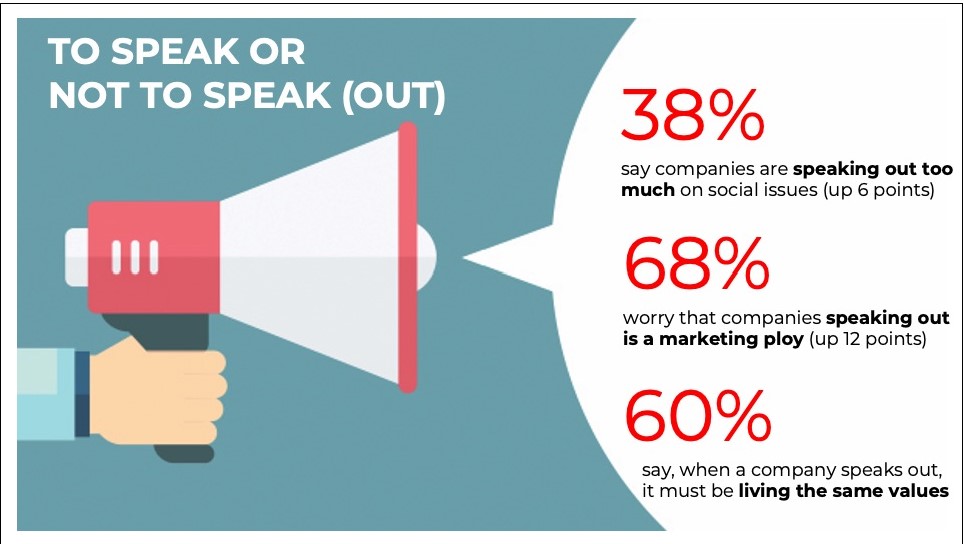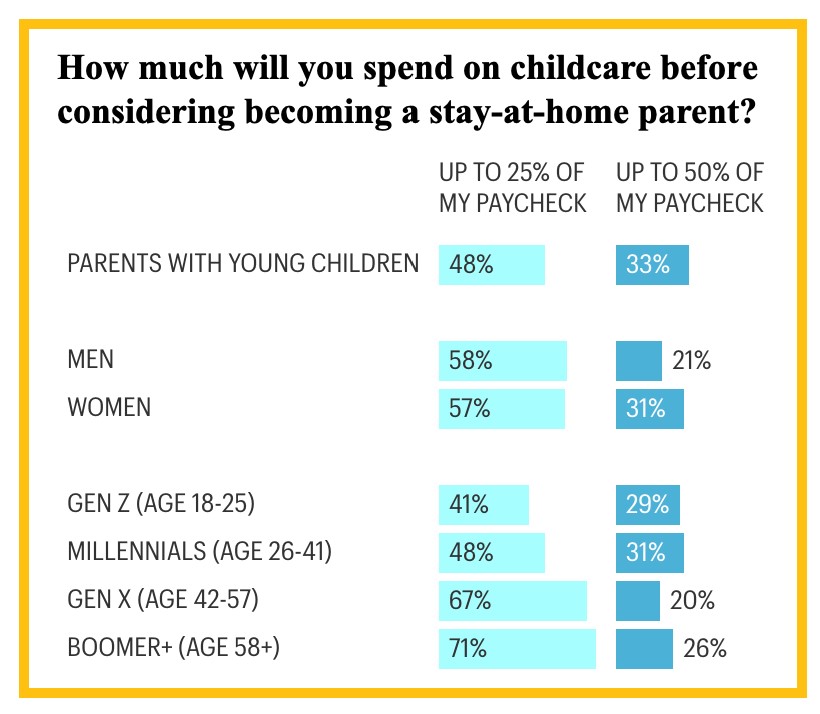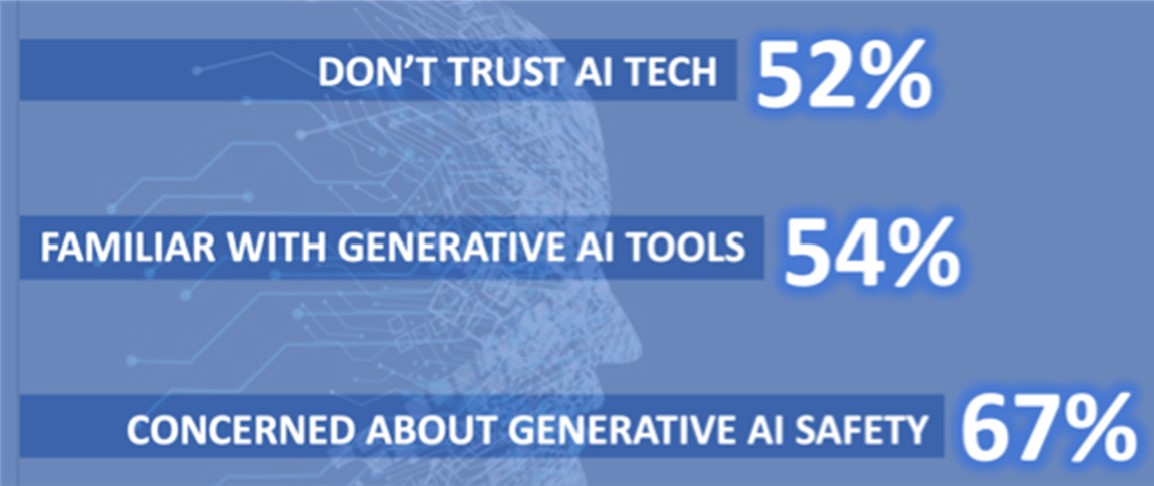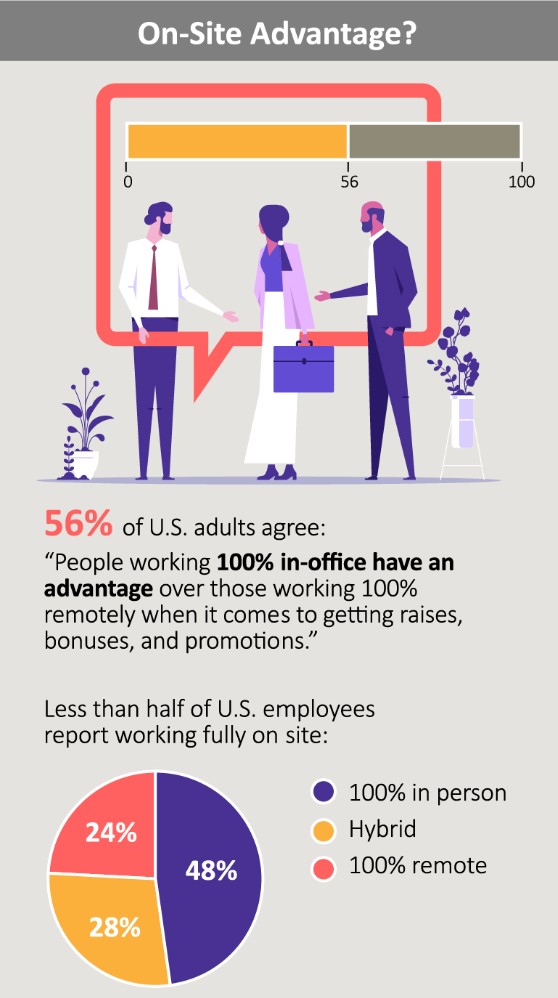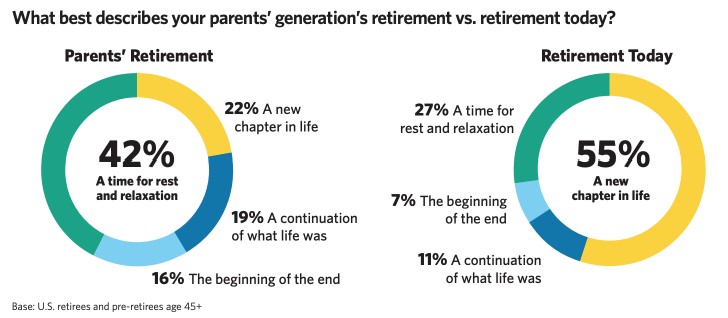By: Ray Day
CONTACT:
We wanted to share our latest consumer and business insights, based on research from Stagwell. Among the highlights of our weekly consumer sentiment tracking (fielded Feb. 10-12):
WORRIES ABOUT ECONOMY JUMP:
Today, 90% of Americans are concerned about the economy and inflation – up 5 points from last week and up sharply from 82% in December.
- 84% worry about U.S. crime rates (up 6 points)
- 82% about a potential U.S. recession (up 2 points)
- 75% about affording their living expenses (up 5 points)
- 75% about political divisiveness (up 3 points)
- 72% about the War on Ukraine (up 2 points)
- 55% about a new COVID-19 variant (down 2 points)
- 47% about losing their jobs (up 2 points)
WHEN SHOULD COMPANIES SPEAK OUT?:
Following the State of the Union (SOTU) address, we surveyed Americans to pinpoint their views on the buy-American theme as well as to update our past research on companies “speaking out” on social issues. We found strong views on both.
“Made in America”
- Nearly three-quarters (73%) of Americans say they often seek American-made products and brands when shopping (up 1 point from July 2022), especially true among those who watched some or all of the SOTU.
- Regarding intentionally purchasing American-made products and brands, 71% report doing so a little bit or a lot.
- 53% have shopped for an American-made product in the last month.
- 76% of Americans agree that there should be more American-made products and brands available in the U.S.
- 76% agree that brands need to make more products in the U.S. (up 1 point from July 2022).
- 56% would be willing to pay more for a product if they knew it was American made.
- However, 45% believe that American-made products already are too expensive.
“Speaking Out in America”
- A third of Americans (38%) think that American companies are speaking out too much on social issues (up 6 points from July 2022).
- 37% believe companies are speaking out the right amount (down 3 points from July 2022), while 25% believe they aren’t speaking out enough (down 3 points).
- 68% of Americans think that, when companies voice their opinion on a social issue, it’s a marketing ploy (up 12 points from July 2022).
- When companies are speaking out on social issues, 71% of Americans agree that a company’s history on social issues is important.
- 60% agree that when a company speaks out on social issues, it must be supported by living their internal company values.
- More Americans believe that there is generally more risk (59%) to a CEO speaking out on social issues (up 5 points from April 2022) than reward (41%).
- Democrats (55%) are more likely to believe there is more reward in a CEO speaking out than Republicans (33%).
- Americans also believe that CEOs expressing their own political views is bad for the company (47%, up 5 points from April 2022), more so than good.
TRAVEL TRENDS FOR THE NEXT DECADE:
During the next three years, nearly 2 billion people will travel at least once a year – making the travel and hospitality industry continually attractive. Yet what does the future hold? Stagwell’s Northstar partnered with travel technology company Amadeus on new research defining four new types of travelers – in a report titled Traveler Tribes 2033 – who will emerge in the next decade along with suggestions on what brands need to do to create relevant travel experiences for them.
- Excited Experientialists:
- 44% are without children and have a mid- to high-income job with flexible working options, which enables them to readily explore the world. They are more likely than other travelers to act on instinct, making them “anti-planners” and favoring less predictable and more exciting accommodation experiences. They also are open to technology like the use of artificial intelligence in the airport environment.
- Memory Makers:
- 44% are ages 42 and older and are habitual in their travel behaviors. They put people first and place less value on technology and sustainability, reassured by existing methods. Despite their skepticism about technology, they are excited about virtual reality and augmented reality preview tours before purchasing a trip.
- Travel Tech-fluencers:
- 48% of the group are under the age of 32, and their perspective is symbolized by how much technology they own. While many want to travel sustainably, they are more conscious about sustainability options around their method of travel, rather than where they’ll be staying.
- Pioneering Pathfinders:
- 82% are between the ages of 23 and 41. They like to plan but are not afraid of risk and are open to new experiences. This group is more willing than others to let sustainability influence their decisions. They will be very comfortable using all forms of alternative payment methods – whether cryptocurrency or within a virtual reality environment.
EMPLOYEES AND HR DISAGREE ON RACIAL EQUITY PROGRESS:
Our new State of Inequity report with Hue illuminates wide disparities along racial lines in workplace opportunity, compensation and experience in a post-pandemic labor market.
- More than 200,000 Black and Latina women have disappeared from the workforce since the pandemic’s beginning. Many have stopped looking for new jobs, making them invisible to unemployment statistics and ineligible for federal benefits.
- Most BIPOC employees report their employer has not instituted racial awareness training (82%) nor have they increased recruiting efforts toward racially diverse hiring (81%).
- A gap exists between HR and employees: 84% of BIPOC employees report their company has not addressed the mental/emotional impact of discrimination on its employees of color since June 2020. At the same time, 91% of HR professionals surveyed say the various diversity-related initiatives their companies have implemented are effective.
- One in four BIPOC women report not being paid fairly and in a comparable way to other colleagues at their level across their company.
- BIPOC women are twice as likely not to be paid fairly and in a comparable way to other colleagues across their company compared to white men.
- Two in Five BIPOC women reported feeling exhausted or burned out last year because of their workplace.
- BIPOC women are twice more likely to report they have felt fatigued related to racial tension or issues at work in the last six months compared to white men.
- More BIPOC women are not comfortable being fully themselves at work, twice as likely compared to white men.
- Even in the face of workplace hardships, BIPOC women are investing in themselves. Nearly twice as many BIPOC women (45%) report gaining new skills or education to become a more competitive job candidate compared to white Americans (27%).
ICYMI:
In case you missed it, check out some of the thought-leadership and happenings around Stagwell making news:
- Vast Majority of Americans Prefer In-Person Job Interviews vs. Virtual
- Exploring the future of money
- The high price of being single: ‘It’s all on one person’
- Americans With Trouble Sleeping Report Their Sleep Affects Their Relationships
As always, if helpful, we would be happy to provide more info on any of these data or insights. Please do not hesitate to reach out.
Thank you.
Related
Articles
Augmented Reality, In the News, Marketing Frontiers
Apr 26, 2024
Legacy Brand, Meet Next-Gen Commerce: Bomb Pop Takes Roblox
Bomb Pop is the most popular ice pop that nobody…
Artificial Intelligence, In the News
Apr 25, 2024
Embracing Comfort Unapologetically with First-Ever AI-Powered La-Z-Boy ‘Decliner’
Building the first-ever AI-powered recliner for the brand that invented…
In the News, Tech
Apr 25, 2024
Protected: Playfully Navigating the Google Booth at CES
Google partnered with Left Field Labs to blend its physical…
Newsletter
Sign Up
By: Ray Day
CONTACT:
We wanted to share our latest consumer and business insights, based on research from Stagwell. Among the highlights of our weekly consumer sentiment tracking (fielded Feb. 3-5):
WORRIES ABOUT JOB LOSSES JUMP:
Today, 85% of Americans are concerned about the economy and inflation – down 2 points from last week and up from 82% in December. Concerns about job losses, however, are on the rise.
- 80% worry about a potential U.S. recession (down 2 points)
- 78% about U.S. crime rates (down 3 points)
- 72% about political divisiveness (down 3 points)
- 70% about affording their living expenses (up 4 points)
- 70% about the War on Ukraine (up 1 point)
- 57% about a new COVID-19 variant (down 1 point)
- 45% about losing their jobs (up 3 points)
18% OF GEN Z WOULD BE HAPPY TO BE LAID OFF:
“Laid off and loving it” is the mood of a small but vocal group of employees caught in the job cuts roiling firms from Wall Street to Silicon Valley, according to our survey with Bloomberg.
- 18% of Gen Z and 15% of Millennial employees say they would be happy being laid off, more so than their older colleagues (Gen X: 8%, Boomers: 6%).
- Overall, one in 10 employees say they would feel thankful (9%), relieved (10%) and happy if laid off today (12%).
- Of those who experienced a layoff in the last year, 42% spent more time with friends and family, on their hobbies (28%) and their physical (26%) and mental health (29%).
- Most employed Americans (43%) say that, if they were laid off today, they would find another job within three months. Yet that changes across generations, with Boomers (28%) less likely to think so than Gen Z (43%), Millennials (48%) or Gen X (47%).
CHILDCARE SPENDING HAS ITS LIMITS:
How much are you willing to spend on childcare before it no longer makes sense to work? Most Americans say an average of $617 a month is fair. Yet, if childcare costs eat away a quarter of their paycheck or more, nearly half of parents with young children under the age of 5 would consider being a stay-at-home parent, according to our survey with Fortune.
- On average, U.S. families spend an average of 17.8% of their income on childcare.
- Younger workers are more willing than older Americans to pay more for childcare. And fathers are willing to spend about $100 more per month than mothers ($668 versus $568).
- More than a third of stay-at-home parents say they left their jobs to care for their children because of financial difficulties in affording childcare (19%) or limited childcare availability (17%).
- Among former and current stay-at-home parents, 36% say they felt forced into leaving the workforce to care for their children.
- 87% of Americans say they would continue working if childcare was more accessible – with high agreement across all age groups.
- 52% of stay-at-home parents with children under the age of 5 believe their careers have been negatively affected by that choice.
- 68% of both men and women believe mothers are penalized more in the workforce after staying home to care for children.
MORE TRUST CONCERNS ABOUT AI:
Americans rely on artificial intelligence to inform everyday consumer choices like movie recommendations and customer service inquiries, yet they draw the line when it comes to trusting AI for high-value applications, such as autonomous vehicles, accessing government benefits and healthcare. Our survey with MITRE also found:
- 48% of Americans believe AI is safe and secure.
- 78% are very or somewhat concerned that AI can be used for malicious intent.
- 82% of Americans and 91% of tech experts support government regulation.
- 70% of Americans and 92% of tech experts agree that there is a need for industry to invest more in AI assurance measures to protect the public.
- Three-quarters of Americans are concerned about deepfakes and other AI-generated content.
- Only 49% would be comfortable having an AI-based online chat for routine medical questions.
- Similarly, only 49% would be comfortable with the federal government using AI to assist benefits processing.
ESG INVESTOR INTEREST GROWS
Most investors are interested in ESG and want their advisors to show them the path forward, based on our survey with Nuveen.
- 75% of investors older than 21 with at least $100,000 in investable assets see their company ownership as a way to get businesses to address ESG-related risks and opportunities.
- 57% would be interested in shifting their portfolios to invest only in companies with net-zero emissions.
- 80% said that companies should be more transparent about ESG issues.
- 73% said they would be more likely to invest in businesses that are open about their plans for addressing those factors.
- Last year’s findings from the 2022 Milken Institute Harris Poll Listening Project found that 68% of executives said their company has as much as a quarter of their portfolio dedicated to ESG investments. Yet 32% said their companies lack ESG investments entirely.
ICYMI:
In case you missed it, check out some of the thought-leadership and happenings around Stagwell making news:
- ‘Funny,’ ‘light-hearted’ and ‘unique’ are top qualities the public wants in Super Bowl ads
- Building brand fandom at the Super Bowl
- Pandemic Pushes Planned Retirement Age by 3 Years
- Gen Z and Millennials Accept Online Creeping and Stalking as Part of Dating Culture
- Stagwell’s Instrument opens applications for 2023 pro bono program supporting black and systemically excluded communities
As always, if helpful, we would be happy to provide more info on any of these data or insights. Please do not hesitate to reach out.
Thank you.
Related
Articles
Augmented Reality, In the News, Marketing Frontiers
Apr 26, 2024
Legacy Brand, Meet Next-Gen Commerce: Bomb Pop Takes Roblox
Bomb Pop is the most popular ice pop that nobody…
Artificial Intelligence, In the News
Apr 25, 2024
Embracing Comfort Unapologetically with First-Ever AI-Powered La-Z-Boy ‘Decliner’
Building the first-ever AI-powered recliner for the brand that invented…
In the News, Tech
Apr 25, 2024
Protected: Playfully Navigating the Google Booth at CES
Google partnered with Left Field Labs to blend its physical…
Newsletter
Sign Up
Insights Rooted in New Whitepaper from NRG, “Building Brand Fandom at the Super Bowl”
NEW YORK and PHOENIX, Feb. 8, 2023 /PRNewswire/ — Research from Stagwell‘s (NASDAQ: STGW) National Research Group (NRG), a global insights leader at the intersection of technology, content, and culture, proves the value for brand activation at major sporting events like the Super Bowl in its newest whitepaper, “Building Brand Fandom at the Super Bowl.” In the report, NRG outlines “the anatomy of a fan” by analyzing Super Bowl fans and non-Super Bowl fans’ responses to questions around their excitement for the game, the advertisements, viewing habits, social media consumption, perceptions of the brands involved, and more.
“We encourage brands to think about the massive potential of cultural moments like these as driving forces for business.
The whitepaper is the second iteration of NRG’s “Brand Fandom” platform in the lead up to Stagwell’s Sport Beach activation at Cannes 2023, tapping into the cultural zeitgeist of sport to unpack the journey to fandom across key categories and audiences, and the value for brands in making fans out of their communities.
“There’s no question the Super Bowl is a pinnacle of culture-moving sports events, drawing everyone from committed NFL fans to passive viewers looking to be entertained,” said NRG EVP, Brand Strategy and Innovation, Fotoulla Damaskos. “In this installment of our research, we proved our hypothesis that the same attributes that draw people to sports – community, creativity, exclusivity – are the same ones that drive brand fandom. We encourage brands to think about the massive potential of cultural moments like these as driving forces for their business.”
“There are few events that command such an energized fan base as the Super Bowl, and combined with the buzz before, during, and after a big sporting event, it’s a no-brainer for brands to become part of the conversation if they want to harness that kind of deeply rooted passion for their own brand,” said Stagwell EVP, Chief Marketing Officer Ryan Linder.
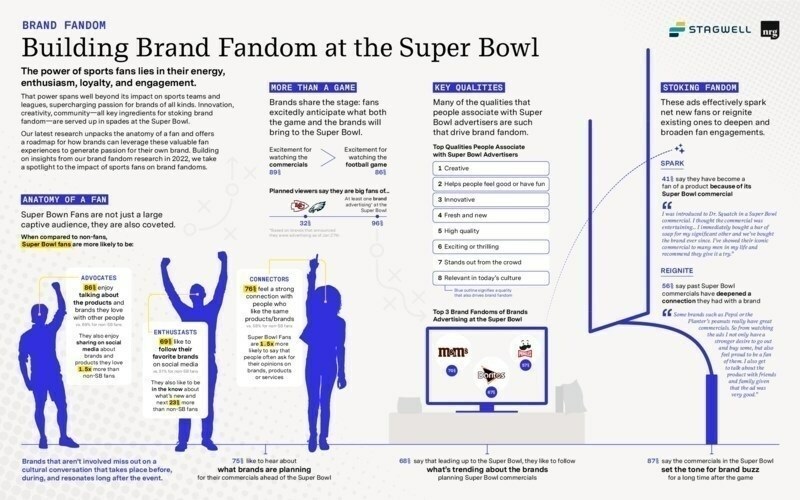
Research found that when compared to non-fans, Super Bowl fans are more than just a large captive audience. They are coveted, as they are more likely to be:
- Advocates: 86% enjoy talking about the products and brands they love with other people (vs. 69% of non-SB fans) and are 1.5x more likely to share on social media about brands and products they love than non-SB fans.
- Enthusiasts: 85% like to be in the know about what’s new and next (vs. 62% of non-SB fans), and 69% like to follow their favorite brands on social media (vs. 51% for non-SB fans).
- Connectors: 76% feel a strong connection with people who like the same products/brands that they like (vs. 58% of non-SB fans) and are 1.5x more likely to say that people often ask for their opinions on brands, products, or services.
Added Highlights
- Of those who plan to watch, 96% say they are a big fan of at least one brand advertising at the Super Bowl – much greater than those who say they are big fans of either the Kansas City Chiefs or the Philadelphia Eagles (32%).
- Fans are just as excited to watch the commercials (89%) as they are the game itself (86%) and the halftime show (85%).
- 87% say the commercials in the Super Bowl set the tone for brand buzz for a long time after the game.
- 41% say they have become a fan of a product because of its Super Bowl commercial.
- 56% say past Super Bowl commercials have deepened a connection they had with a brand.
Brand Innovators Sports Marketing Upfronts
Ahead of the Big Game, the research will take center stage at the “Anatomy of a Fan: Building Brand Passion” panel today, hosted by Brand Innovators and taking place at 10:50 a.m. MST at Hotel Valley Ho. Brand leaders and marketing experts, including Stagwell’s Linder and NRG’s Damaskos, Diageo Senior Vice President of Whiskeys Portfolio in North America Sophie Kelly, and United Airlines Managing Director, Global Sponsorships and Inclusive Partnerships Jennifer Entenman, will answer questions such as:
- How are you harnessing fan power to keep consumers engaged with your brand?
- How much do experiences like the Super Bowl help brands connect to new audiences?
- How can brands continue to leverage and build upon buzz even after the Super Bowl?
To attend the panel and other programming, please register with Brand Innovators here. NRG introduced the research platform at Advertising Week 2022 with “The Power of Brand Fandom.”
Methodology
Data used in this report comes from a study of 1,003 US consumers, ages 18 to 65, conducted from Jan. 27-30, 2023, representative of the national population in terms of age, gender and ethnicity.
About National Research Group
National Research Group is a leading global insights and strategy firm at the intersection of entertainment and technology. Rooted in four decades of industry expertise, the world’s leading marketers turn to us for insights into growth and strategy for any content, anywhere, on any device. Working at the confluence of content, culture and technology, NRG offers insights for bold storytellers everywhere. To learn more, please visit www.nationalresearchgroup.com, and follow us on LinkedIn and Instagram.
About Stagwell
Stagwell is the challenger network built to transform marketing. We deliver scaled creative performance for the world’s most ambitious brands, connecting culture-moving creativity with leading-edge technology to harmonize the art and science of marketing. Led by entrepreneurs, our 13,000+ specialists in 34+ countries are unified under a single purpose: to drive effectiveness and improve business results for their clients. Join us at www.stagwellglobal.com.
Media Contact
Sarah Arvizo
pr@stagwellglobal.com
SOURCE Stagwell Inc.
Related
Articles
Augmented Reality, In the News, Marketing Frontiers
Apr 26, 2024
Legacy Brand, Meet Next-Gen Commerce: Bomb Pop Takes Roblox
Bomb Pop is the most popular ice pop that nobody…
Artificial Intelligence, In the News
Apr 25, 2024
Embracing Comfort Unapologetically with First-Ever AI-Powered La-Z-Boy ‘Decliner’
Building the first-ever AI-powered recliner for the brand that invented…
In the News, Tech
Apr 25, 2024
Protected: Playfully Navigating the Google Booth at CES
Google partnered with Left Field Labs to blend its physical…
Newsletter
Sign Up
By: Ray Day
CONTACT:
We wanted to share our latest consumer and business insights, based on research from Stagwell. Among the highlights of our weekly consumer sentiment tracking (fielded Jan. 27-29):
ECONOMIC WORRIES MIXED:
Today, 87% of Americans are concerned about the economy and inflation – up 1 point from last week and up from 82% in December.
- 82% worry about a potential U.S. recession (down 1 point)
- 81% about U.S. crime rates (up 1 point)
- 75% about political divisiveness (up 4 points)
- 69% about the War on Ukraine (up 1 point)
- 66% about affording their living expenses (down 5 points)
- 58% about a new COVID-19 variant (down 2 points)
- 42% about losing their jobs (down 7 points)
PARENTS WANT CHILDCARE SUPPORT AT WORK:
Parents increasingly feel unsupported in the workplace and expect more childcare support from employers and the government, based on our new Parent Confidence Report with KinderCare.
- 61% of working parents say there is a disconnect between the level of support they need and the benefits their employer provides.
- Childcare benefits are the second most important reason for parents staying at their current job – with 18% ranking them as the most crucial benefit – behind health insurance.
- More than half of working parents would stay at their current job if their employer provided childcare benefits, such as pre-tax benefits, emergency/backup childcare and on-site childcare.
- 70% of parents say childcare is at a crisis point in terms of accessibility and affordability.
- 66% believe the government should offer universal childcare to all children, from birth to kindergarten.
1 IN 10 LOOKING FOR NEW HOME, BUT WITH UNREALISTIC PRICE EXPECTATIONS:
For the fifth year in a row, most Americans (83%) say buying a home is a priority. Yet, in our latest survey with NerdWallet, high mortgage rates and a seller-friendly housing market prove to be obstacles – along with unrealistic home price expectations.
- 11% of Americans say they plan to buy a home in the next year.
- Prospective buyers hope to spend $269,200 on average. This is significantly lower than the typical home price of $379,100.
- 32% of Americans feel worse about their ability to purchase a home in 2023 than in 2022 (a 7-point increase from last year).
- The top reasons for the more negative outlook include a worsening economy (58%), higher mortgage rates (57%) and higher home prices (57%).
- 67% of Americans say a housing market crash is imminent in the next three years.
INVESTORS RETHINK RETIREMENT PLANS:
Turbulent market conditions and rampant inflation have forced investors to consider working after retirement, based on our survey with Nationwide.
- 69% of non-retired investors say post-retirement employment could lie ahead.
- 44% of these investors inclined to keep working say they’ll have to supplement their retirement savings or income out of necessity.
- 40% of non-retired investors plan to move to a different city or region after retiring, with the most common reasonings being lower cost of living (43%) and lower taxes (34%) – far ahead of being closer to family (22%).
- 49% of non-retired investors with a financial advisor are “very nervous” about spending down their retirement savings in today’s current market environment.
LACK OF TRUST OVERSHADOWS NEW AI TOOLS:
Businesses might need to slow their roll when it comes to adopting AI tools like ChatGPT and DALL-E2, according to our latest study with AdAge.
- 52% don’t trust AI tech.
- 54% are familiar with generative AI tools, and nearly a fifth have used one.
- 67% of Americans are concerned about the safety of generative AI technology.
- Only 29% said they have not used generative AI nor are they interested in doing so.
- Less than half (44%) say that it is easy to tell the difference between something created by AI and something created by a human.
- 58% think things created by generative AI tools are less impressive than things created by people.
ICYMI:
In case you missed it, check out some of the thought-leadership and happenings around Stagwell making news:
- Five Things to Know About ChatGPT
- Generative AI – how marketers should navigate consumer distrust
- Augmented reality. The bright future of women’s sports. What Gen Z wants from work. Stagwell’s National Research Group explores all of these topics in a new premium magazine, Boundless.
- 20 brands gaining popularity with Gen Z
- About three-quarters of people who plan to watch the Super Bowl said they’re excited for the ads
- Big Tech’s Free Ride Is Coming to an End
As always, if helpful, we would be happy to provide more info on any of these data or insights. Please do not hesitate to reach out.
Thank you.
Related
Articles
Augmented Reality, In the News, Marketing Frontiers
Apr 26, 2024
Legacy Brand, Meet Next-Gen Commerce: Bomb Pop Takes Roblox
Bomb Pop is the most popular ice pop that nobody…
Artificial Intelligence, In the News
Apr 25, 2024
Embracing Comfort Unapologetically with First-Ever AI-Powered La-Z-Boy ‘Decliner’
Building the first-ever AI-powered recliner for the brand that invented…
In the News, Tech
Apr 25, 2024
Protected: Playfully Navigating the Google Booth at CES
Google partnered with Left Field Labs to blend its physical…
Newsletter
Sign Up
By: Mark Penn
Originally Published on: Barron’s
About the author: Mark Penn is chairman and CEO of Stagwell, a technology-based global marketing services firm.
Technology’s Wild West era is coming to an end. For decades, American policy has been hands-off technology to let it grow and innovate. On the eve of the dawn of artificial intelligence and the metaverse, the bad taste consumers have of social media and its divisiveness suggests that more aggressive regulation is just around the corner.
The recent round of layoffs won’t do much to staunch consumers’ fears that technology is enabling the possibility of a surveillance state. Their concerns will accelerate movement on tech privacy, censorship, anticompetitiveness, and national security legislation in the U.S. and abroad in 2023.
Half of consumers in America fear that technology will undermine their personal freedoms over the next decade, and 70% worry that tech will give more power to big corporations. The younger generations are particularly suspicious of Big Tech. Elon Musk gave some journalists access to Twitter’s records after he bought the social company. The reports they produced, known as the Twitter Files, were a damning revelation that government officials were pulling the strings behind the curtain and that the tech companies were willingly obedient much of the time.
In a recent Harvard-Harris Poll, 70% of voters now support a national law to prevent corporate censorship. The saving grace for the tech industry may be that many Democrats believe that they have been benefiting from the censorship and will oppose such a law, not understanding that what goes around comes around. They will regret blocking this legislation when they believe that they are the ones being censored. I expect this to be a significant issue in the 2024 campaign.
If Big Brother colluding with Big Tech keeps consumers up at night, the thought of TikTok being a Trojan horse for Chinese influence and spying is catnip for Congress seeking to look tough on China. Before the close of the year, leaders let loose a rash of state-based restrictions on the use of the platform by government officials. The House banned its members and staff from downloading the app. TikTok has dozens of trends working against it: Democrats and Republicans are largely aligned on the need to curb China’s influence, the Biden administration’s negotiations with TikTok have stalled, and difficult news continues to leak that employees at TikTok have misused the app, most recently to spy on journalists. The company has said it doesn’t share data with Beijing, and it fired staff members that it said were involved in the spying incident.
Voters might be less invested in the diplomatic implications of a TikTok ban than your senator, but rest assured that if the government enacts an outright ban, consumers will be up in arms. TikTok is the fastest-growing social-media platform in the U.S. and has been taking ad-market share from its legacy competitors. Expect a compromise that allows TikTok to operate but puts restrictions on how it can use and distribute information.
Beyond the U.S., data-privacy regulations will mature in 2023, meaning that global businesses will face more severe restrictions as they do business across borders. Countries have moved to enact data-privacy regulations since the implementation of the European Union’s General Data Protection Regulation in 2018, and now more than 100 have rules in place, according to Forrester. By 2024, an estimated 75% of the world’s population will be covered under modern privacy regulations.
The good news is that businesses have tracked the “will they, won’t they” drama around Google’s plan to phase out user-tracking “cookies” long enough that they’ve found solutions to replace the tool—and have adjusted data-privacy standards. But a more bullish Federal Trade Commission, with a renewed focus on “harmful commercial surveillance and lax data security,” will mean that it isn’t time to rest on laurels. It’s unlikely that the U.S. will get a national standard like the proposed American Data Privacy Protection Act. But expect the FTC to oppose virtually any merger-and-acquisition activities in tech, even if the government loses its cases.
The impulse isn’t uniquely American. The EU is also taking anticompetitive action against tech giants with the adoption of the Digital Markets Act, which aims to curb the market power of dominant digital companies. We have yet to see alignment on comparable federal efforts in the U.S. but the FTC’s recent intervention into Microsoft’s Activision deal hints at more to come. The FTC will take on Google, too, for alleged anticompetitive practices, in September.
Big Tech remains a critical engine of economic opportunity and innovation. But once it began carrying news and political speech, the industry crossed a line that put it in politicians’ crosshairs. This eroded their traditionally loyal Republican free-market supporters as the Democrats were moving further to the left, taking on a more anti–big business flavor. The combination of these trends just may result in the first major year of regulation of the industry.
Related
Articles
Augmented Reality, In the News, Marketing Frontiers
Apr 26, 2024
Legacy Brand, Meet Next-Gen Commerce: Bomb Pop Takes Roblox
Bomb Pop is the most popular ice pop that nobody…
Artificial Intelligence, In the News
Apr 25, 2024
Embracing Comfort Unapologetically with First-Ever AI-Powered La-Z-Boy ‘Decliner’
Building the first-ever AI-powered recliner for the brand that invented…
In the News, Tech
Apr 25, 2024
Protected: Playfully Navigating the Google Booth at CES
Google partnered with Left Field Labs to blend its physical…
Newsletter
Sign Up
CONTACT
hello@stagwellglobal.com
SIGN UP FOR OUR INSIGHTS BLASTS
As we look to the future of marketing, one thing is certain: Artificial Intelligence (A.I.) will play a major role in shaping the industry. From generative A.I. revolutionizing the way we approach creativity to predictive A.I. providing unprecedented insights and analytics, the potential of A.I. in marketing is vast and exciting.
But what exactly does the next decade hold for this rapidly evolving field? We asked some of the top minds across Stagwell, including leaders from the Stagwell Marketing Cloud, PRophet, Code and Theory, Colle McVoy, Yamamoto, Concentric Health Experience, and Vitro, to share their predictions and insights on the future of A.I. in marketing.
A.I. Won’t Eat the World – But it Will Give Consumers Time and Brands Opportunity
Mansoor Basha, Chief Technology Officer, Stagwell Marketing Cloud
“AI and ML are at the forefront of driving digital transformation across industries and will undoubtedly continue to do so. In a 2011 op-ed, Marc Andreessen observed an environment in which software was increasingly becoming king, famously stating that ‘software is eating the world.’ His observation came about a decade after the peak of the 1990s dot-com bubble as companies like Facebook and Skype were booming. Looking to the next decade, I believe that AI and ML will be eating the world, changing the way we work, live, and interact with brands.

I predict that as AI technology changes everything around us—with things like driverless cars and more efficient, sustainable systems—consumers will have more time on their hands. This will give brands the opportunity to leverage more pointed channels to reach audiences that have more free time to participate. AI will find brands’ ideal audiences and reach consumers in the right place at the right time, especially as AR and VR go mainstream.
And as the hype around ChatGPT and generative AI simmers down, marketing teams will become more comfortable adopting a wide range of AI tools that help them build powerful workflows that drive innovation, aid in decision making, and create new business models. ChatGPT will be an entry point for many marketing teams as they look for relevant ways to use new technologies in their day-to-day work.”
Enhance, Not Replace
Aaron Kwittken, Founder and CEO, PRophet
“Generative AI, while not perfect, is the needle that pierced the veil of doubt and fear amongst marketers when it comes to adopting AI technology. The current limitations are only encumbered by the lack of data needed to make it more performative. 
When paired with the right inputs, this technology will make marketers more efficient by enabling them to create base content faster and better, freeing them up for higher value tasks like editing and strategy deployment. In addition to content creation for press releases, social posts, pitches, marketing collateral, blogs, and more, I see this technology as a huge aid when it comes to legal and compliance issues, especially when working with third parties like influencers and celebrity spokespeople.
Make no mistake, though, the downsides will need to be managed.
Generative AI may reduce the need for junior staff; could be used as an accelerant to create and spread mis and disinformation; and could make professionals more complacent, less creative, and more transactional. This is where it will be on marketers to get creative about how they use this tool to enhance their current activities, not replace them.”
The Key Word with A.I.? Enablement
Dan Gardner, Code and Theory Co-Founder and Executive Chairman
“At the moment, where we will see AI transformation is in how we conduct business. While traditional creative shops may be focused on stunts and activations, I believe the key word here is ‘enablement,’ and how the technology allows businesses to do what they haven’t been able to do before.
Where the technology is built into systems that yield long-term results. What this looks like exactly, we still do not know for certain, but I do know that technology at its best is when it has the power to drive meaningful change in people’s lives.”
Watch Out for A.I.’s “WordPress” Era
Yamamoto Digital Team
In the end it’s not the technology that sells, it’s the story it tells.”
Welcome to AI as shiny new toy, with machine learning, natural language processing and open access combining to create a sandbox for early adopters. Expect showy, public activations (e.g. Ryan Reynolds reading an AI-generated script for Mint Mobile) as well as backstage experimentation. We marketers will find it hard to pass on an instant first draft of everything we do.
Then AI enters its WordPress phase. Smaller players will benefit from “good enough” templates that auto-generate content. Meanwhile experts will game AI’s limitations to circumvent the inevitable commoditization.
There are also threats. To brand safety. To copyright laws. To beliefs about creativity. We’ll have hard conversations about everything from unconscious bias to criminal misuse. Then, in ten years, full impact. We imagine a golden age of hyper-targeted, account-based marketing. We also predict AI depreciating the value of individual assets a la Napster killing the compact disc. Expect real people to respond with bespoke, humanistic, artisan campaigns.
Finally, a confession. That tasty quote at the top? ChatGPT wrote it. The prompt: Crystalize the future of AI in the haunted, optimistic voice of Don Draper. How’d we do?
“Make it More Human”
Ben Majoy, Creative Director, Observatory
We’re in the industry of threading the needle of perfection, constantly trying to find new ways to get as close as possible to what sometimes feels like an impossible vision. Artificial Intelligence is now creating a superficial answer to that question, but we’ll soon see that creating something narratively resonant means a lot more than a “vision” coming to life.

In the same way that a perfect cheeseburger just doesn’t taste as good as a sloppy one (or any other curated vs. bespoke experience example you want to use), we’re going to see that no matter how accurate the A.I. responds to our prompt, it will never FEEL as good as the human-made. There’s humanity in what we do.
Until Artificial Intelligence can replicate nostalgia, trauma, and emotions like seeing someone you haven’t seen in ten years and picking up right where you left off, we will also feel like something is missing. We’re about to enter the era of “make it more human,” taking the place of the “I’ll know it when I see it” feedback loop.
Sturgeon’s Law
Tom Sullivan, CEO, Vitro
RESPONSE TO YOUR PROMPT, FROM CHAT GPT (195 words)
AI is already revolutionizing marketing…and this continue over the next decade. A big step will be through the use of machine learning algorithms to analyze consumer data and make more targeted, personalized recommendations. This will likely include personalized email campaigns, targeted social media ads, and customized product recommendations on e-commerce sites. 
Or course…there are chatbots and virtual assistants. These tools allow companies to interact with customers in real-time, providing immediate support and assistance. They will also be able to handle routine tasks, freeing up human customer service reps to handle more complex inquiries. As time marches on these will continue to get better (and seem even more human).
AI will also have a major impact on content marketing, as machine learning algorithms will be able to analyze consumer data and create more effective content. This could include personalized blog posts, videos, and other types of content that are more likely to engage and convert consumers.
Overall, the use of AI in marketing is likely to increase efficiency, reduce costs, and improve the customer experience. Whilst there may be some initial disruptions as companies adopt these new technologies, the long-term benefits are likely to be significant.
RESPONSE TO YOUR PROMPT, FROM TOM (195 words)
See above. It’s so generative. It’s Sturgeon’s Law (90% of everything is crap). My guess is…AI will generate at least 50% of marketing assets/thinking. It’ll probably all be pretty smart…pretty good. But when it gets to emotional storytelling, powerful creative…it’ll be just like people, generating a lot of “crap”. AI is digital. Digital is binary. Zeroes and Ones. Blacks and whites. Much of creativity comes from the muted tones, the instincts and intuitions…the random brain synapses that live in the grays. I’ve spent a lot of time playing with AI in several arts (music, writing, imagery). Some of it really interesting, and maybe even gives bits of inspiration…but so much of it is just a mashup of elements we’ve seen before. Usually…you can tell AI was the ghost in the machine, right away.
These are relatively early days, and they are super exciting…but here are three watchouts that come to mind: racial biases and presenting incorrect information as true fact. And…look at the “open” in Open AI. It seems to be claiming that everything is open source. So I wonder; will I will end up being a windfall for intellectual property attorneys? Time will tell.
The InkWell is Half Full for Copywriters
John Neerland, VP, Group Creative Director, Colle McVoy
Over the past month, ChatGPT has hit the world, the industry and advertising copywriters in particular, like a ton of virtual bricks.
The reaction from writers I’ve talked to has ranged from cautious pessimism to downright dread. Gallows humor abounds. One writer quipped that it might finally be time to get HVAC certified.
 But I’m choosing, for now, to see the inkwell as half full. Just like Photoshop didn’t eliminate art directors and designers, ChatGPT won’t make copywriters obsolete.
But I’m choosing, for now, to see the inkwell as half full. Just like Photoshop didn’t eliminate art directors and designers, ChatGPT won’t make copywriters obsolete.
Out of the gate, ChatGPT is only as good as the inputs it receives. And even then, ask it to write headlines for a specific product or brand and you get a list that feels more like 50s newspaper retail ads than the One Show.
So, if it isn’t pumping out pencil-worthy lines just yet, how can copywriters harness ChatGPT (and not be trampled by it)? Some initial ways include using it to get over blank page syndrome, getting unstuck from one idea or approach, exploring new tones and styles, making copy more search friendly and speeding up the more mundane writing tasks to free up time for more interesting ones.
Over the next decade, my hope is that copywriters find ways to leverage AI not only as a technological aid to make their work easier and more efficient, but a tool to help make their ideas bigger and their writing better than they’ve ever imagined. Or maybe that’s just what the bots want us to believe.
A Foundational 21st Century Development
Allison+Partners Digital team
Generative AI is about to change our world. The capability of AI to generate original and useful creative work at scale is both amazing and terrifying, yet it will be one of the foundational technologies of the 21st century. There’s no question it will change how we – as communicators and consumers – live, work, learn and even think.
Tools like ChatGPT make it easier to quickly create targeted content, both written and visual. What’s more, it will help expedite what was once a very manual (and tedious) process by customizing and personalizing content for journalists, analysts and customers. In turn, there’s every chance that many of these pitches will be received by AIs with subsequent stories likely written by them as well. (In fact, some already are – controversially.)
Yes, AI may help everyone create content, just like calculators and spreadsheets help us generate numbers. But AI cannot imagine. It cannot bring years of client experience and strategy to the table. And it cannot replace passion, empathy or excitement for our clients and their offerings. AI is just one tool, plain and simple. We can and should use it to reinforce our best, most human qualities in the many years ahead. However, it will still need you – your humanity, your personality, your perspective and your soul.
—-
This piece is part of Stagwell’s Marketing Frontiers content series on Artificial Intelligence. Visit this page to view other perspectives and work from Stagwell’s global teams on A.I.
Related
Articles
Augmented Reality, In the News, Marketing Frontiers
Apr 26, 2024
Legacy Brand, Meet Next-Gen Commerce: Bomb Pop Takes Roblox
Bomb Pop is the most popular ice pop that nobody…
Artificial Intelligence, In the News
Apr 25, 2024
Embracing Comfort Unapologetically with First-Ever AI-Powered La-Z-Boy ‘Decliner’
Building the first-ever AI-powered recliner for the brand that invented…
In the News, Tech
Apr 25, 2024
Protected: Playfully Navigating the Google Booth at CES
Google partnered with Left Field Labs to blend its physical…
Newsletter
Sign Up
NEW HOUSE SPEAKER KEVIN MCCARTHY EMERGES WITH MODERATE CONSERVATIVE IMAGE FROM THE SPEAKERSHIP FIGHT, NOT FAR RIGHT
OVERWHELMING MAJORITY (OVER 8 IN 10 VOTERS) WANTS CONGRESS TO PASS LEGISLATION THAT SECURES SOCIAL SECURITY
TWO-THIRDS OF VOTERS SUPPORT COMPROMISE IMMIGRATION REFORM THAT SECURES THE BORDER AND HELPS DACA RECIPIENTS
NEW YORK and CAMBRIDGE, Mass., Jan. 20, 2023 /PRNewswire/ — Stagwell (NASDAQ: STGW) today released the results of the January Harvard CAPS / Harris Poll, a monthly collaboration between the Center for American Political Studies at Harvard (CAPS) and the Harris Poll and HarrisX.
President Joe Biden’s approval rating remains stable but underwater at 42%. Ahead of the looming debt ceiling fight, 63% of voters want Congress to raise the limit but with restraints on future spending. Download key results from the poll here.
“Most voters think that the Biden classified documents are a serious issue and there is bipartisan support to investigate what happened, and whether the Biden team was aware of this issue before the midterms,” said Mark Penn, Co-Director of the Harvard-CAPS Harris Poll and Stagwell Chairman and CEO. “The Biden White House has so far appeared flat footed on this issue.”
Added Penn: “Most voters also want Democrats to come to the table on debt ceiling negotiations because their frustrations over what they see as runaway spending are boiling over. Biden and the Democrats will need to act strategically as we head into the 2024 election cycle.”
BIDEN’S CLASSIFIED DOCUMENTS CONCERN MOST AMERICANS, INCLUDING DEMOCRATS
- 64% of voters, including 44% of Democrats, think the presence of classified documents in several unsecure locations is a “serious” breach of national security.
- Over 7 in 10 voters support both the House of Representatives and the FBI investigating how these documents were misplaced.
- Half of voters, including one-third of Democrats, think the DOJ treated Biden’s classified documents case more leniently than Donald Trump’s.
- 74% of voters, including two-thirds of Democrats, support the Attorney General’s appointment of a special prosecutor for the Biden documents case.
VOTERS SIDE WITH REPUBLICANS ON DEBT CEILING NEGOTIATIONS AND SPENDING RESTRAINTS
- Americans care greatly about default: 69% of voters, including over two-thirds of each party, think a temporary debt default would be a “huge issue.”
- When given the size of the national debt ($31 trillion), 63% of voters want Congress to raise the debt limit only with restraints on future spending.
- Americans side with the GOP on negotiations: 61% of voters, including a slim majority of Democrats themselves, think the Democrats should cave to prevent a default.
KEVIN MCCARTHY EMERGES WITH MODERATE IMAGE FROM THE SPEAKERSHIP FIGHT
- 78% of voters see McCarthy as moderate or conservative, not far right.
- 53% of voters, including a majority of both parties, think McCarthy will work with Democrats to create bipartisan legislation.
SUPPORT FOR SOCIAL SECURITY AND IMMIGRATION LEGISLATION UNITES AMERICANS
- 85% of voters, including 88% of Republicans, want legislation that secures Social Security for two more decades.
- Two-thirds of voters, including 62% of Republicans, want compromise immigration legislation that strengthens the border but also gives DACA recipients a path to citizenship.
AMERICANS ARE SPLIT ON NON-COMPETES BUT WANT MORE CRYPTOCURRENCY REGULATION
- 60% of Democrats support and 60% of Republicans oppose the prospect of an FTC executive order that would ban all non-compete agreements.
- A majority of voters want more regulation on cryptocurrencies and consumer privacy/security on the Internet, but less or equal regulation on marijuana.
The January Harvard CAPS / Harris Poll survey was conducted online within the United States from January 18-19, 2023, among 2,050 registered voters by The Harris Poll and HarrisX. Follow the Harvard CAPS Harris Poll podcast at https://www.markpennpolls.com/ or on iHeart Radio, Apple Podcasts, Spotify, and other podcast platforms.
The Harris Poll is a global consulting and market research firm that strives to reveal the authentic values of modern society to inspire leaders to create a better tomorrow. It works with clients in three primary areas: building twenty-first-century corporate reputation, crafting brand strategy and performance tracking, and earning organic media through public relations research. One of the longest-running surveys in the U.S., The Harris Poll has tracked public opinion, motivations, and social sentiment since 1963, and is now part of Stagwell, the challenger holding company built to transform marketing.
HarrisX is a technology-driven market research and data analytics company that conducts multi-method research in the U.S. and over 40 countries around the world on behalf of Fortune 100 companies, public policy institutions, global leaders, NGOs and philanthropic organizations. HarrisX was the most accurate pollster of the 2020 U.S. presidential election.
The Center for American Political Studies (CAPS) is committed to and fosters the interdisciplinary study of U.S. politics. Governed by a group of political scientists, sociologists, historians, and economists within the Faculty of Arts and Sciences at Harvard University, CAPS drives discussion, research, public outreach, and pedagogy about all aspects of U.S. politics. CAPS encourages cutting-edge research using a variety of methodologies, including historical analysis, social surveys, and formal mathematical modeling, and it often cooperates with other Harvard centers to support research training and encourage cross-national research about the United States in comparative and global contexts. More information at https://caps.gov.harvard.edu/.
Related
Articles
Augmented Reality, In the News, Marketing Frontiers
Apr 26, 2024
Legacy Brand, Meet Next-Gen Commerce: Bomb Pop Takes Roblox
Bomb Pop is the most popular ice pop that nobody…
Artificial Intelligence, In the News
Apr 25, 2024
Embracing Comfort Unapologetically with First-Ever AI-Powered La-Z-Boy ‘Decliner’
Building the first-ever AI-powered recliner for the brand that invented…
In the News, Tech
Apr 25, 2024
Protected: Playfully Navigating the Google Booth at CES
Google partnered with Left Field Labs to blend its physical…
Newsletter
Sign Up
By: Ray Day
CONTACT:
We wanted to share our latest consumer and business insights, based on research from The Harris Poll, a Stagwell agency.
Among the highlights of our weekly consumer sentiment tracking (fielded Jan. 13-15):
ECONOMIC WORRIES EDGE BACK UP:
Today, 88% of Americans are concerned about the economy and inflation – up 4 points from last week and the same level as two weeks ago.
- 82% worry about a potential U.S. recession (up 1 point)
- 80% about U.S. crime rates (no change)
- 74% about affording their living expenses (up 2 points)
- 72% about political divisiveness (down 5 points)
- 65% about the War on Ukraine (down 7 points)
- 59% about a new COVID-19 variant (down 1 point)
- 48% about losing their jobs (down 2 points)
THE OPPOSITE OF QUIET QUITTING:
What’s the opposite of quiet quitting? Seems that “quietly up-working” is the new thing. Our poll with Yoh signals a willingness among some employees to prove their worth and ensure job security in the face of economic and workplace downturns.
- Today, 48% of Americans are worried about losing their jobs.
- 29% say they are more likely to go above and beyond by taking on a new project, learning new skills or undergoing additional training to position themselves as an asset to their employer.
- 22% are willing to work more hours than are required of them without receiving additional compensation.
- At the same time, 23% are just as likely to consider working for a new company as staying at their current organization.
- 29% are more likely to seek work outside their current to supplement their current income.
DO IN-OFFICE EMPLOYEES HAVE THE EDGE?:
Do in-office employees have an advantage over their working-remotely counterparts? Most Americans think they do, according to our survey with the American Staffing Association.
- 56% believe employees who work exclusively in-office have a competitive advantage over their fully remote counterparts when it comes to raises, bonuses and promotions.
- Despite this, less than half (48%) of workers report they are working completely in-person, 28% are working on a hybrid schedule, and 24% are fully remote.
- 51% of women employees said they work fully on-site, compared with 44% of men.
- Employed parents (33%) of children under the age of 18 were more likely to work a hybrid schedule, while the majority of those without minor children work on site full-time (51% versus 43% remote).
- 46% feel pressured to work during their time off.
- 44% would be willing to take a pay cut if it meant they had greater freedom to work remotely.
- 40% are worried about layoffs at their company during the next six months.
KITCHEN NOW MOST LOVED ROOM IN THE HOUSE:
COVID transformed kitchens into workspaces, study halls and entertainment centers for cooped-up families – and made them the most popular room in the house, according to our survey with Bertazzoni.
- Three out of four homeowners (75%) say they use the kitchen more than any other room in their home.
- What are homeowners looking for in a new kitchen? 84% want sustainable products.
- Some also want bling – with “prep kitchens” becoming one of the hottest new premium kitchen trends. Overall, 42% of homeowners saying they would want a second kitchen in their home if money were no object.
- That jumps to 61% among those aged 18 to 44.
ICYMI:
In case you missed it, check out some of the thought-leadership and happenings around Stagwell making news:
- 7 trends from CES 2023
- 6 Transformation Trends I’m Watching From CES 2023
- Inflation has less of an impact on snacking than meals
As always, if helpful, we would be happy to provide more info on any of these data or insights. Please do not hesitate to reach out.
Thank you.
Related
Articles
Augmented Reality, In the News, Marketing Frontiers
Apr 26, 2024
Legacy Brand, Meet Next-Gen Commerce: Bomb Pop Takes Roblox
Bomb Pop is the most popular ice pop that nobody…
Artificial Intelligence, In the News
Apr 25, 2024
Embracing Comfort Unapologetically with First-Ever AI-Powered La-Z-Boy ‘Decliner’
Building the first-ever AI-powered recliner for the brand that invented…
In the News, Tech
Apr 25, 2024
Protected: Playfully Navigating the Google Booth at CES
Google partnered with Left Field Labs to blend its physical…
Newsletter
Sign Up
By: Ray Day
CONTACT:
We wanted to share our latest consumer and business insights, based on research from The Harris Poll, a Stagwell agency.
Among the highlights of our weekly consumer sentiment tracking (fielded Jan. 6-8):
ECONOMIC WORRIES MODERATE:
Today, 84% of Americans are concerned about the economy and inflation – down 4 points from last week.
- 81% worry about a potential U.S. recession (down 3 points)
- 80% about U.S. crime rates (down 4 points)
- 77% about political divisiveness (no change)
- 72% about affording their living expenses (down 3 points)
- 72% about the War on Ukraine (down 1 point)
- 60% about a new COVID-19 variant (down 1 point)
- 50% about losing their jobs (down 4 points)
IN-PERSON SHOPPERS RETURN:
Nearly half of Americans are looking for a bargain – and more are planning to shop in person this year versus last. Those are among the insights in our survey with DailyPay and Dollar Tree.
- 44% are more likely to prioritize shopping for bargains in store compared to last year.
- Overall, 67% of Americans plan to spend either the same or more in 2023 as they did in 2022 on retail purchases.
- 73% plan to shop the same or more in person this year.
- When it comes to Americans’ preferences regarding purchasing items in-store versus online: 81% prefer in-store for furniture, 69% in-store for home goods, 65% in-store for apparel, 65% in-store for sporting goods and 59% in-store for electronics.
NOT YOUR PARENTS’ RETIREMENT:
To most Americans, retirement is not their parents’ retirement. Rather than a destination, it’s become a new journey, based on our survey with Edward Jones and Age Wave.
- 55% of pre-retirees and retirees ages 45 and older say that retirement today is best described as “a new chapter in life” versus the 27% who view it as “a time for relaxation.”
- When asked how today’s retirees view their parents’ retirement, 42% said it was “a time for relaxation” and only 22% described it as “a new chapter in life.”
- Half of retirees say they are “reinviting themselves in their retirement,” particularly women (53% versus men at 47%).
- 72% say they are now “able to realize their hopes and dreams.”
- At the same time, retirement isn’t without worries: Pre-retirees and retirees ages 45+ are worried about their physical health (49%), healthcare costs (34%), unexpected expenses (32%) and economic conditions (32%).
DRY JANUARY GROWS:
Dry January continues to grow in popularity – with better health and weight loss the prime motivators, according to our survey with Go Brewing.
- 79% of Americans who consume alcohol said they considered participating in Dry January this year.
- The top motivators include a desire to be healthier (52%), lose weight (35%) and the ability to focus better on personal or work goals (33%).
AIR TRAVEL TURBULENCE:
Southwest Airlines has some work to do to repair its reputation after cancelling flights during the busy holiday travel season, our survey with AdAge
- 45% of Americans have a worse opinion of the airline since before the meltdown.
- That dissatisfaction rises to 52% among people who have recently traveled with Southwest.
- 41% of respondents say they are less likely to travel with Southwest now compared to before the mass cancellations
ICYMI:
In case you missed it, check out some of the thought-leadership and happenings around Stagwell making news:
- Zillow CEO: Traditional offices are as outdated as typewriters. Employers need to adapt. (based on Harris Poll data)
- Quick Quitting: A New Trend Among Deskless Workers?
- Most employers would sack workers for improper social media posts: Poll
- 2023 predictions for communicators (#2)
As always, if helpful, we would be happy to provide more info on any of these data or insights. Please do not hesitate to reach out.
Thank you.
Related
Articles
Augmented Reality, In the News, Marketing Frontiers
Apr 26, 2024
Legacy Brand, Meet Next-Gen Commerce: Bomb Pop Takes Roblox
Bomb Pop is the most popular ice pop that nobody…
Artificial Intelligence, In the News
Apr 25, 2024
Embracing Comfort Unapologetically with First-Ever AI-Powered La-Z-Boy ‘Decliner’
Building the first-ever AI-powered recliner for the brand that invented…
In the News, Tech
Apr 25, 2024
Protected: Playfully Navigating the Google Booth at CES
Google partnered with Left Field Labs to blend its physical…
Newsletter
Sign Up
DESANTIS WOULD BEAT TRUMP IN A PRIMARY HEAD-TOHEAD THAT INCLUDES GOP-LEANING INDEPENDENTS
TWO-THIRDS OF AMERICANS WANT STRICTER IMMIGRATION CONTROLS WHEN TOLD THE EXTENT OF BORDER CROSSINGS
NEW YORK and CAMBRIDGE, Mass., Dec. 16, 2022 /PRNewswire/ — Stagwell (NASDAQ: STGW) today released the results of the December Harvard CAPS / Harris Poll, a monthly collaboration between the Center for American Political Studies at Harvard (CAPS) and the Harris Poll and HarrisX.
Joe Biden’s approval rating remains steady at 42% as two-thirds of Americans think inflation is still increasing. Ron DeSantis continues his ascent as the poll shows him defeating Biden in a 2024 matchup for the first time.
Strong majorities of voters think Twitter shadowbanned users and engaged in political censorship during the 2020 election. Seventy percent also want new national laws protecting users from corporate censorship. Download key results from the poll, which includes more on free speech, immigration, and inflation, here.
“Americans continue to show they are looking for new leaders. Ron DeSantis strengthens his grip as the Republican alternative to Donald Trump, and Elon Musk is in some ways the new Trump as the outsider taking on the establishment,” said Mark Penn, Co-Director of the Harvard-CAPS Harris Poll and Stagwell Chairman and CEO. “Americans also want more information: they are buying the Musk argument that there is an information chokehold in this country, whether by Big Tech, government, or mainstream media.”
AMERICANS THINK INFLATION IS INCREASING AND WILL LINGER
- 66% of voters think inflation is increasing, and 61% of voters think inflation will continue for at least another year.
- But Americans see economic troubles easing slightly: the percentage of voters who think the economy is heading in the right track and who are optimistic about their lives next year both increased by 3 points.
- Voters are split on whether Biden’s policies caused inflation.
IT’S NOW A TWO-WAY GOP RACE BETWEEN TRUMP AND DESANTIS
- Trump is still the GOP frontrunner in an open field: 48% of GOP voters would choose him in a primary, compared to 25% for DeSantis.
- But in a GOP head-to-head, DeSantis defeats Trump by 4 points if GOP-leaning Independent voters are included; Trump wins the head-to-head by 10 points among only GOP voters.
- For the first time, the poll shows DeSantis defeating Biden in a 2024 matchup, by 4 points; Trump would also defeat Biden by 5 points.
VOTERS BELIEVE TWITTER ENGAGED IN POLITICAL CENSORSHIP AND ARE ROOTING FOR ELON MUSK
- Americans believe in the Twitter Files revelations: 64% think Twitter was secretly shadow banning users, and 64% also think Twitter engaged in political censorship during the 2020 election.
- Americans like Elon Musk: 61% think Musk is trying to clean up Twitter from abuses, and his personal favorability is 8 points above water.
- The Hunter Biden laptop story continues to generate controversy: 61% of voters think Twitter’s decision to ban tweets about the laptop was based on political bias; but 42%, including a majority of Democrats, believe the laptop is Russian disinformation.
- 70% of voters, including strong majorities across the political spectrum, support new national laws protecting internet users from corporate censorship.
AMERICANS THINK ILLEGAL IMMIGRATION IS A SERIOUS ISSUE BUT DON’T KNOW THE NUMBERS
- Voters are concerned about the effects of Biden’s immigration policies: 67% think they have encouraged illegal immigration, and 57% think they are increasing the flow of drugs and crime.
- Americans are unfamiliar with the extent of illegal immigration: 64% correctly said the number of illegal border crossings has increased under Biden, but the median voter underestimated that number by a factor of 10 (250-500 thousand vs. 2-3 million).
- Two-thirds of Americans want Biden to issue stricter policies to reduce the flow of illegal immigrants, when told the actual number of illegal crossings in the last year (over 2.75 million).
The December Harvard CAPS / Harris Poll survey was conducted online within the United States from December 14-15, 2022, among 1,851 registered voters by The Harris Poll and HarrisX. Follow the Harvard CAPS Harris Poll podcast at https://www.markpennpolls.com/ or on iHeart Radio, Apple Podcasts, Spotify, and other podcast platforms.
The Harris Poll is a global consulting and market research firm that strives to reveal the authentic values of modern society to inspire leaders to create a better tomorrow. It works with clients in three primary areas: building twenty-first-century corporate reputation, crafting brand strategy and performance tracking, and earning organic media through public relations research. One of the longest-running surveys in the U.S., The Harris Poll has tracked public opinion, motivations, and social sentiment since 1963, and is now part of Stagwell, the challenger holding company built to transform marketing.
About the Harvard Center for American Political Studies
The Center for American Political Studies (CAPS) is committed to and fosters the interdisciplinary study of U.S. politics. Governed by a group of political scientists, sociologists, historians, and economists within the Faculty of Arts and Sciences at Harvard University, CAPS drives discussion, research, public outreach, and pedagogy about all aspects of U.S. politics. CAPS encourages cutting-edge research using a variety of methodologies, including historical analysis, social surveys, and formal mathematical modeling, and it often cooperates with other Harvard centers to support research training and encourage cross-national research about the United States in comparative and global contexts. More information at https://caps.gov.harvard.edu/.
Media contact
Brandon Dixon
pr@stagwellglobal.com
SOURCE Stagwell Inc.
Related
Articles
Augmented Reality, In the News, Marketing Frontiers
Apr 26, 2024
Legacy Brand, Meet Next-Gen Commerce: Bomb Pop Takes Roblox
Bomb Pop is the most popular ice pop that nobody…
Artificial Intelligence, In the News
Apr 25, 2024
Embracing Comfort Unapologetically with First-Ever AI-Powered La-Z-Boy ‘Decliner’
Building the first-ever AI-powered recliner for the brand that invented…
In the News, Tech
Apr 25, 2024
Protected: Playfully Navigating the Google Booth at CES
Google partnered with Left Field Labs to blend its physical…

